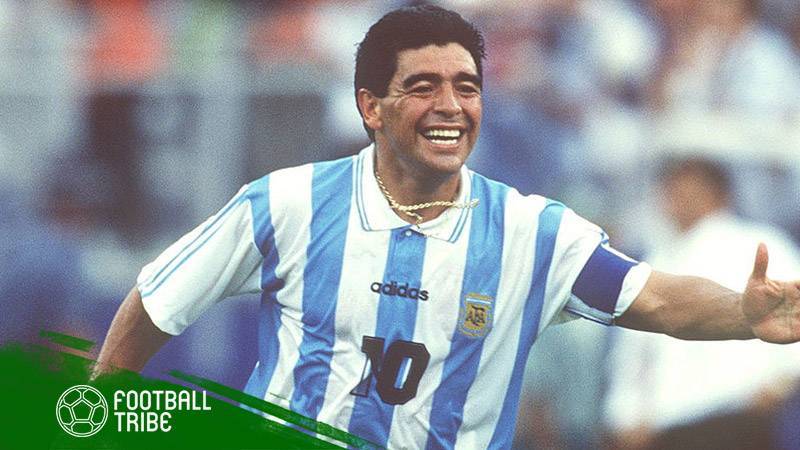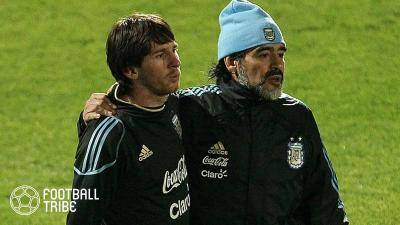
Four minutes…
Four minutes were all it took as one individual – with the entire football world watching with total disbelief, awe and bewilderment – imperceptibly raised his wand to perform his ‘Hand of God’ miracle. Miracle? Or more like a compelling sleight-of-hand spell of wizardry that has never been witnessed ever since that historic day in 1986?
It was the same four minutes that ultimately evolved into an inexplicably rich and fully-lived life, indulgences and excesses included, that spanned six remarkable decades, ending finally on Wednesday as news of the passing on of Diego Maradona echoed throughout the world.
But, if we can begin to understand the significance of these four minutes, perhaps we’ll better understand why Maradona meant so much to so many. And why, as his one-time protégé Lionel Messi – his fellow Argentine and universal GOAT contender alongside the likes of the other demi-gods Pele and Cristiano Ronaldo – put it:
“He is gone, but he will be with us for eternity.”
Diego Maradona. Iconoclastic, dazzling, famous, infamous, extraordinary, genius, quixotic, flamboyant, outrageous, provocative – the expletives are endless, yet probably still insufficient to describe this infinitely larger-than-life Houdini of football. Argentina’s eternally-enduring football icon whose near-flawless performances on the football pitch were equally matched by his flawed indulgences off it.
Indisputably one of the game’s most gifted players ever, the idiosyncratic, in-your-face Argentine boasted a rare combination of prodigious talent, flair, dexterity, tactical nous and the exhilarating speed and grace of a gazelle weaving its way across a rugged, stark terrain to escape the deadly clutches of its predators to continually mesmerise his legions of fans around the globe.
Outside of the hypnotic glare of the stadiums’ spotlights, the adulation morphed into incredulous bewilderment as his notorious excesses were fodder for the international media that gleefully churned out shocking headlines as his life plunged headlong into a mire of drug abuse, association with criminal cartels and personal crises.
Born 60 years ago in a single storey dwelling in Villa Fiorito in a Buenos Aires shanty town, Diego Armando Maradona escaped the poverty of his youth to become a football superstar considered by some to be even greater than Brazil’s Pele. The epitome of many a rags-to-riches phenomenon, Maradona was fortunate not to have a long association with the commonalities of normal life as his precocious talent, the pursuit of which began at eight years old, removed him from the grim reality of life in the barrios, a neighborhood characterized by extreme poverty and violence.
Fortuitously, the existence of a set of makeshift goalposts in a barely amenable, yet thankfully useable, outdoor space within close proximity was the gift of providence that would ultimately change the course of this life and gift the sport of football one of its most colorful, defining figures.
Short and stocky at just 5ft 5in, Maradona was definitely not one’s dream depiction of the quintessential athlete. But like they say, looks can deceive as his God-gifted silken skills encompassing his daredevil agility, masterful ball control, artful dribbling and incisive passing more than compensated for his diminutive stature.
Maradona’s 34 goals in 91 appearances for Argentina document only part of the story of his rollercoaster football career. The Argentine, who scored 259 goals in 491 matches, pipped his Brazilian rival in a poll to determine the greatest player of the 20th Century, before Fifa changed the voting rules so that both players could be honored.
He – questionably to some, especially irate English football fanatics of that era – led his country to victory at the 1986 World Cup in Mexico and a place in the final four years later. The quarter-final of the earlier tournament would be a foretaste of the controversies that would later engulf his life.
The political context of the 1986 World Cup victory deepened Maradona’s symbolic importance to Argentina, delivering for his country a second World Cup victory following the crushing embarrassment of the ill-fated Falklands War debacle.
Those epiphanous four minutes on June 22, 1986, in front of 114,500 souls at the Azteca – with the “Hand of God” that guided the ball over the head of England’s Peter Shilton and into the back of the net, followed by the 10-second, 60-yard ski slopes-inspired slaloming dash forever immortalized as the greatest World Cup goal of all time – epitomized the alchemy of sports.
The heightened drama in the eternity of those four minutes showed his unstoppable, worldly drive to succeed at all costs and the divine skills that invariably elevate the best of athletes into something other-worldly and celestial. They also fully reaffirmed the narrative of Maradona as the people’s Messiah, the iconoclast more than capable and willing to tear down the system.
The symbolic relevance and undercurrent tensions underpinning the fact that the two yin and yang goals were struck against a colonialist England – the nation that not only invented the game but also built a global empire, that at that time embodied the much-resented “colonial master” – cannot be disregarded within the larger context of the squaring off of both nations. Which was why every Argentine on the face of the earth adoringly celebrated and serenaded their new savior when the mercurial Argentine got away with his handy ‘Hand of God’ exploit and lifted the World Cup a few weeks later.
To the millions of Argentineans, Maradona epitomized a timely redeeming power from above.
The match against England had already been charged with an extra friction and tension, so it certainly mattered not to the 40-odd million Argentineans back home whether their hero had the help of the ‘Hand of God’ or hand of a mortal in conjuring up that victory. After all, he did follow up almost immediately with a second goal of such subliminal grace, beginning from Argentina’s goalmouth area and brilliantly slaloming past England’s barrage of defenders to nurse the ball home with apparent consummate ease at the other end of the pitch.
With that magnificent flourish, he provided all Argentineans with the honor they were looking for to lift their heads symbolically as justification of Argentina’s comeback post-Falklands war.
Credit: Football Tribe Malaysia







